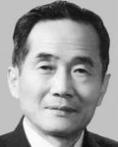You can help expand this article with text translated from the corresponding article in Korean. (December 2014) Click [show] for important translation instructions.
|
Lee Ki-poong | |
|---|---|
| 이기붕 | |
 Lee in 1954 | |
| Mayor of Seoul | |
| In office 6 June 1949 – 8 May 1951 | |
| Preceded by | Yun Bo-seon |
| Succeeded by | Kim Taeson |
| Minister of National Defense | |
| In office 7 May 1951 – 29 March 1952 | |
| President | Syngman Rhee |
| Preceded by | Shin Song-mo |
| Succeeded by | Shin Tae-young |
| Personal details | |
| Born | December 20, 1896 Goesan County, North Chungcheong Province, Joseon |
| Died | April 28, 1960 (aged 63) Seoul, South Korea |
| Lee Ki-poong | |
| Hangul | 이기붕 |
|---|---|
| Hanja | 李起鵬 |
| RR | I Gibung |
| MR | I Kibung |
Lee Ki-poong (20 December 1896 – 28 April 1960) was a South Korean politician who served as leader of the Liberal Party from 1954 to 1960, the Minister of National Defense from May 1951 to March 1952, and the Mayor of Seoul from June 1949 to May 1951. Lee was a supporter of President Syngman Rhee and the leader of the Liberal Party, the ruling party of South Korea under Rhee during the First Republic from 1948 to 1960. By the 1954 election, Lee became the most prominent member of the Liberal Party, and was considered one of Rhee's closest right-hand men.[1]
Lee was elected Vice President of South Korea in the controversial March 1960 presidential election where Rhee was elected to his third term as President of South Korea. Both won by a very wide margin, and the election was widely condemned in South Korea for election rigging amid growing public opposition to Rhee's corrupt and authoritarian rule. As a result, the April Revolution took place in mid-April 1960, which resulted in Rhee resigning on April 26, 1960 and fleeing the country. Lee resigned before taking office as Vice President, but the results of the March election were invalidated and the office itself was later abolished in June.
On April 28, 1960, in an annex of Rhee's Seoul mansion, Lee and his family were shot killed by his eldest son, Lee Kang-seok (1937 – April 28, 1960), who then killed himself in a murder–suicide.[2][3]
- ^ Kim 2021, p. 237.
- ^ Choy, Bong-youn (1971). Korea: A History. Tuttle Publishing. p. 352. ISBN 9781462912483.
- ^ Oh, John Kie-chiang (1999). Korean Politics: The Quest for Democratization and Economic Development. Cornell University Press. p. 43. ISBN 0801484588.
